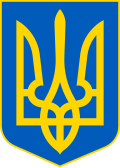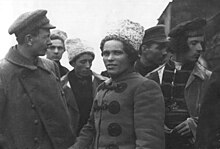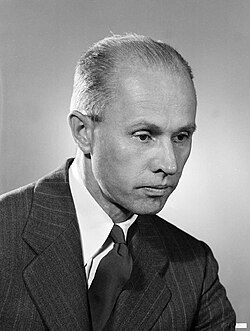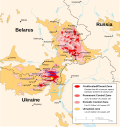Portal:Ukraine
The Ukraine Portal - Портал України
Ukraine Україна (Ukrainian) | |
|---|---|
| ISO 3166 code | UA |
Ukraine is a country in Eastern Europe. It is the second-largest country in Europe after Russia, which borders it to the east and northeast. Ukraine also borders Belarus to the north; Poland and Slovakia to the west; Hungary, Romania and Moldova to the southwest; and the Black Sea and the Sea of Azov to the south and southeast. Kyiv is the nation's capital and largest city, followed by Kharkiv, Dnipro, and Odesa. Ukraine's official language is Ukrainian.
Humans have inhabited Ukraine since 32,000 BC. During the Middle Ages, it was the site of early Slavic expansion and later became a key centre of East Slavic culture under the state of Kievan Rus', which emerged in the 9th century. Kievan Rus' became the largest and most powerful realm in Europe in the 10th and 11th centuries, but gradually disintegrated into rival regional powers before being destroyed by the Mongols in the 13th century. For the next 600 years the area was contested, divided, and ruled by a variety of external powers including the Grand Duchy of Lithuania, the Kingdom of Poland, the Polish–Lithuanian Commonwealth, the Austrian Empire, the Ottoman Empire, and the Tsardom of Russia.
The Cossack Hetmanate emerged in central Ukraine in the 17th century but was partitioned between Russia and Poland before being absorbed by the Russian Empire in the late 19th century. Ukrainian nationalism developed and, following the Russian Revolution in 1917, the short-lived Ukrainian People's Republic was formed. The Bolsheviks consolidated control over much of the former empire and established the Ukrainian Soviet Socialist Republic, which became a constituent republic of the Soviet Union in 1922. In the early 1930s, millions of Ukrainians died in the Holodomor, a human-made famine. During World War II, Ukraine was occupied by Germany and endured major battles and atrocities, resulting in 7 million civilians killed, including most Ukrainian Jews.
Ukraine gained independence in 1991 as the Soviet Union dissolved and declared itself neutral. A new constitution was adopted in 1996 as the country transitioned to a free market liberal democracy amid endemic corruption and a legacy of state control. The Orange Revolution of 2004–2005 ushered electoral and constitutional reforms. Resurgent political crises prompted a series of mass demonstrations in 2014 known as the Euromaidan, leading to a revolution, at the end of which Russia unilaterally occupied and annexed Ukraine's Crimean Peninsula, and pro-Russian unrest culminated in a war in Donbas with Russian-backed separatists and Russia. Russia launched a full-scale invasion of Ukraine in 2022. (Full article...)
In the news
- 6 April 2025 – Russian invasion of Ukraine
- 2025 Sumy Oblast incursion
- Russian troops reportedly capture the village of Basivka in Sumy Oblast, Ukraine. (Reuters)
- Kyiv strikes
- A Russian airstrike in Darnytskyi District, Kyiv, Ukraine, kills one person and injures three others. (CTV News)
- Kryvyi Rih strikes
- The death toll from Friday's missile strike on Kryvyi Rih, Ukraine, rises to 20 deaths, including several children, and 75 injuries. (CTV News)
- 5 April 2025 – Russian invasion of Ukraine
- Kryvyi Rih strikes
- The Ukrainian government declares April 6 as a day of mourning following yesterday's Russian missile strike on Kryvyi Rih in Dnipropetrovsk Oblast, Ukraine, that killed twenty people, one of the deadliest strikes since the start of the invasion. (de Volkskrant)
- 4 April 2025 – Russo-Ukrainian War
- Russian invasion of Ukraine
- Kharkiv strikes, Attacks on civilians in the Russian invasion of Ukraine
Featured pictures
Did you know (auto-generated)

- ... that some severe environmental impacts of the invasion of Ukraine can be seen from space?
- ... that following the energy price shock caused by the Russian invasion of Ukraine, the Turkish government intervened to have the country's renewable energy subsidise coal and gas?
- ... that the United Ukrainian Ballet Company, consisting of exiled dancers based in The Hague, has toured the UK, Singapore, Australia and the US?
- ... that the Ukrainian composer Borys Lyatoshynsky composed his second opera, Shchors in 1937–38, about a military figure from Ukraine who fought for the Soviet Red Army in the Ukrainian–Soviet War?
- ... that the Jihadist Burkinabè rebels' ongoing siege of Djibo has been described as a "Ukrainian death"?
- ... that Sarah Ashton-Cirillo, covering the Russian invasion of Ukraine, said that Ukrainians care less about her being transgender than Americans do?
More did you know -
- ... that Ukrainian naturalist, lecturer, artist and author John Lhotsky was credited as the first discoverer of gold in New South Wales?
- ... that the married Western Ukrainian Clergy became a hereditary caste that dominated western Ukrainian society?
- ... that the Khreschatyk is the main street of Ukrainian capital Kyiv on which Orange Revolution and other historical events mainly took place?
- ... that Vasyl Avramenko is often referred as "The father of the Ukrainian dance"?
- ... that according to legend, a tunnel leads from the Kamianets-Podilskyi Castle to the Khotyn Fortress which is 20 kilometres (12 mi) away?
- ... that the Kryvbas economic region in Ukraine is one of the largest iron ore and steel industry centers in Europe?
Selected article -

The West Ukrainian People's Republic (Ukrainian: Західноукраїнська Народна Республіка (ЗУНР), romanized: Zakhidnoukrainska Narodna Respublika (ZUNR); see other names) was a short-lived state that controlled most of Eastern Galicia from November 1918 to July 1919. It included major cities of Lviv, Ternopil, Kolomyia, Drohobych, Boryslav, Stanyslaviv and right-bank Peremyshl. Apart from lands of Eastern Galicia, it also claimed the northern part of Bukovyna and the Carpathian Ruthenia. Politically, the Ukrainian National Democratic Party (the precursor of the interwar Ukrainian National Democratic Alliance) dominated the legislative assembly, guided by varying degrees of Greek Catholic, liberal and socialist ideology. Other parties represented included the Ukrainian Radical Party and the Christian Social Party.
The ZUNR emerged as a breakaway state amid the dissolution of Austria-Hungary, and in January 1919 nominally united with the Ukrainian People's Republic (UPR) as its autonomous Western Oblast. Poland had also claimed this territory, and by July occupied most of it and forced the West Ukrainian government into exile. When the UPR decided late the same year that it would trade the territory for an alliance with Poland against Soviet Russia, the exiled West Ukrainian government broke with the UPR. The exiled government continued its claim until it dissolved in 1923. (Full article...)
In the news
- 6 April 2025 – Russian invasion of Ukraine
- 2025 Sumy Oblast incursion
- Russian troops reportedly capture the village of Basivka in Sumy Oblast, Ukraine. (Reuters)
- Kyiv strikes
- A Russian airstrike in Darnytskyi District, Kyiv, Ukraine, kills one person and injures three others. (CTV News)
- Kryvyi Rih strikes
- The death toll from Friday's missile strike on Kryvyi Rih, Ukraine, rises to 20 deaths, including several children, and 75 injuries. (CTV News)
- 5 April 2025 – Russian invasion of Ukraine
- Kryvyi Rih strikes
- The Ukrainian government declares April 6 as a day of mourning following yesterday's Russian missile strike on Kryvyi Rih in Dnipropetrovsk Oblast, Ukraine, that killed twenty people, one of the deadliest strikes since the start of the invasion. (de Volkskrant)
- 4 April 2025 – Russo-Ukrainian War
- Russian invasion of Ukraine
- Kharkiv strikes, Attacks on civilians in the Russian invasion of Ukraine
Selected anniversaries for April

- April 16, 2000 — Ukraine's national referendum takes place on the issue of reformation the governing system of Ukraine.
- April 22, 2006 — Two homemade bombs exploded in different supermarkets in the Ukrainian city of Kharkiv.
- April 26, 1986 — Reactor No. 4 of the Chernobyl Nuclear Power Plant exploded at 01:23 A.M.
- April 29, 1918 — Constitution of the Ukrainian People's Republic, a constitutional document, was approved by the Central Rada, but never announced.
- April 29, 1918 — The Holiday of Ukrainian Sea. On this day the main parts of Black Sea fleet in Sevastopol hoisted ukrainian flags.
Photo gallery
Related portals
Religions in Ukraine
Post Soviet states
Other countries
WikiProjects and collaborations
Associated Wikimedia
The following Wikimedia Foundation sister projects provide more on this subject:
-
Commons
Free media repository -
Wikibooks
Free textbooks and manuals -
Wikidata
Free knowledge base -
Wikinews
Free-content news -
Wikiquote
Collection of quotations -
Wikisource
Free-content library -
Wikiversity
Free learning tools -
Wikivoyage
Free travel guide -
Wiktionary
Dictionary and thesaurus
New articles
Ukrainian editions of Wikimedia projects


































































